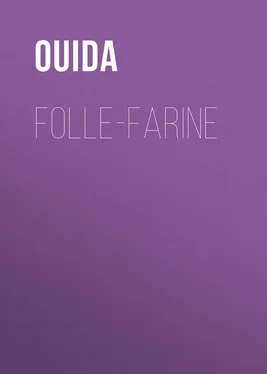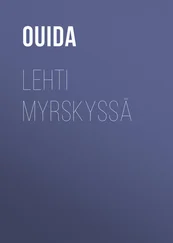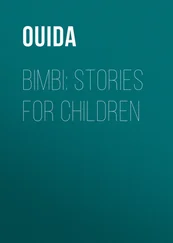Ouida - Folle-Farine
Здесь есть возможность читать онлайн «Ouida - Folle-Farine» — ознакомительный отрывок электронной книги совершенно бесплатно, а после прочтения отрывка купить полную версию. В некоторых случаях можно слушать аудио, скачать через торрент в формате fb2 и присутствует краткое содержание. Жанр: foreign_prose, literature_19, foreign_antique, на английском языке. Описание произведения, (предисловие) а так же отзывы посетителей доступны на портале библиотеки ЛибКат.
- Название:Folle-Farine
- Автор:
- Жанр:
- Год:неизвестен
- ISBN:нет данных
- Рейтинг книги:5 / 5. Голосов: 1
-
Избранное:Добавить в избранное
- Отзывы:
-
Ваша оценка:
- 100
- 1
- 2
- 3
- 4
- 5
Folle-Farine: краткое содержание, описание и аннотация
Предлагаем к чтению аннотацию, описание, краткое содержание или предисловие (зависит от того, что написал сам автор книги «Folle-Farine»). Если вы не нашли необходимую информацию о книге — напишите в комментариях, мы постараемся отыскать её.
Folle-Farine — читать онлайн ознакомительный отрывок
Ниже представлен текст книги, разбитый по страницам. Система сохранения места последней прочитанной страницы, позволяет с удобством читать онлайн бесплатно книгу «Folle-Farine», без необходимости каждый раз заново искать на чём Вы остановились. Поставьте закладку, и сможете в любой момент перейти на страницу, на которой закончили чтение.
Интервал:
Закладка:
Summoned by his mother, he flew to the rescue of the sanctified spring.
"Get you gone!" he shouted. "Get you gone, you child of hell! How durst you touch the blessed basin? Do you think that God struck water from the stone for such as you?"
Folle-Farine lifted her head and looked him in the face with her audacious eyes and laughed; then tossed her head again and plunged it into the bright living water, till her lips, and her cheeks, and all the rippling hair about her temples sparkled with its silvery drops.
The sacristan, infuriated at once by the impiety and the defiance, shrieked aloud:
"Insolent animal! Daughter of Satan! I will teach you to taint the gift of God with lips of the devil!"
And he seized her roughly with one hand upon her shoulder, and with the other raised the hoe and brandished the wooden staff of it above her head in threat to strike her; whilst his old mother, still thrusting her lofty headgear and her wrinkled face from out the door, screamed to him to show he was a man, and have no mercy.
As his grasp touched her, and the staff cast its shadow across her, Folle-Farine sprang up, defiance and fury breathing from all her beautiful fierce face.
She seized the staff in her right hand, wrenched it with a swift movement from its hold, and, catching his head under her left arm, rained blows on him from his own weapon, with a sudden gust of breathless rage which blinded him, and lent to her slender muscular limbs the strength and the force of man.
Then, as rapidly as she had seized and struck him, she flung him from her with such violence that he fell prostrate on the pavement of the court, caught up the metal pail which stood by ready filled, dashed the water over him where he lay, and, turning from him without a word, walked across the courtyard, slowly, and with a haughty grace in all the carriage of her bare limbs and the folds of her ragged garments, bearing the empty osier basket on her head, deaf as the stones around her to the screams of the sacristan and his mother.
In these secluded cloisters, and in the high noontide, when all were sleeping or eating in the cool shelter of their darkened houses, the old woman's voice remained unheard.
The saints heard, no doubt, but they were too lazy to stir from their niches in that sultry noontide, and, except the baying of a chained dog aroused, there was no answer to the outcry: and Folle-Farine passed out into the market-place unarrested, and not meeting another living creature. As she turned into one of the squares leading to the open country, she saw in the distance one of the guardians of the peace of the town, moving quickly towards the cloisters, with his glittering lace shining in the sun and his long scabbard clattering upon the stones.
She laughed a little as she saw.
"They will not come after me ," she said to herself. "They are too afraid of the devil."
She judged rightly; they did not come.
She crossed all the wide scorching square, whose white stones blazed in the glare of the sun. There was nothing in sight except a stray cat prowling in a corner, and three sparrows quarreling over a foul-smelling heap of refuse.
The quaint old houses round seemed all asleep, with the shutters closed like eyelids over their little, dim, aged orbs of windows.
The gilded vanes on their twisted chimneys and carved parapets pointed motionless to the warm south. There was not a sound, except the cawing of some rooks that built their nests high aloft in the fretted pinnacles of the cathedral.
Undisturbed she crossed the square and took her way down the crooked streets that led her homeward to the outlying country. It was an old, twisted, dusky place, with the water flowing through its center as its only roadway; and in it there were the oldest houses of the town, all of timber, black with age, and carved with the wonderful florid fancies and grotesque conceits of the years when a house was to its master a thing beloved and beautiful, a bulwark, an altar, a heritage, an heirloom, to be dwelt in all the days of a long life, and bequeathed in all honor and honesty to a noble offspring.
The street was very silent, the ripple of the water was the chief sound that filled it. Its tenants were very poor, and in many of its antique mansions the beggars shared shelter with the rats and the owls.
In one of these dwellings, however, there were still some warmth and color.
The orange and scarlet flowers of a nasturtium curled up its twisted pilasters; the big, fair clusters of hydrangea filled up its narrow casements; a breadth of many-colored saxafrage, with leaves of green and rose, and blossoms of purple and white, hung over the balcony rail, which five centuries earlier had been draped with cloth of gold; and a little yellow song-bird made music in the empty niche from which the sculptured flower-de-luce had been so long torn down.
From that window a woman looked down, leaning with folded arms above the rose-tipped saxafrage, and beneath the green-leaved vine.
She was a fair woman, white as the lilies, she had silver pins in her amber hair, and a mouth that laughed sweetly. She called to Folle-Farine,—
"You brown thing; why do you stare at me?"
Folle-Farine started and withdrew the fixed gaze of her lustrous eyes.
"Because you are beautiful," she answered curtly. All beautiful things had a fascination for her.
This woman above was very fair to see, and the girl looked at her as she looked at the purple butterflies in the sun; at the stars shining down through the leaves; at the vast, dim, gorgeous figures in the cathedral windows; at the happy children running to their mothers with their hands full of primroses, as she saw them in the woods at springtime; at the laughing groups round the wood-fires in the new year time when she passed a lattice pane that the snowdrift had not blocked; at all the things that were so often in her sight, and yet with which her life had no part or likeness.
She stood there on the rough flints, in the darkness cast from the jutting beams of the house; and the other happier creature leaned above in the light, white and rose-hued, and with the silver bells of the pins shaking in her yellow tresses.
"You are old Flamma's granddaughter," cried the other, from her leafy nest above. "You work for him all day long at the mill?"
"Yes."
"And your feet are bare, and your clothes are rags, and you go to and fro like a packhorse, and the people hate you? You must be a fool. Your father was the devil, they say: why do you not make him give you good things?"
"He will not hear," the child muttered wearily. Had she not besought him endlessly with breathless prayer?
"Will he not? Wait a year—wait a year."
"What then?" asked Folle-Farine, with a quick startled breath.
"In a year you will be a woman, and he always hears women, they say."
"He hears you."
The fair woman above laughed:
"Perhaps; in his fashion. But he pays me ill as yet."
And she plucked one of the silver pins from her hair, and stabbed the rosy foam of the saxafrage through and through with it; for she was but a gardener's wife, and was restless and full of discontent.
"Get you gone," she added quickly, "or I will throw a stone at you, you witch; you have the evil eye, they say, and you may strike me blind if you stare so."
Folle-Farine went on her way over the sharp stones with a heavy heart. That picture in the casement had made that passage bright to her many a time; and when at last the picture had moved and spoken, it had only mocked her and reviled her as the rest did.
The street was dark for her like all the others now.
The gardener's wife, leaning there, with the green and gold of the vineleaves brushing her hair, looked after her down the crooked way.
"That young wretch will be more beautiful than I," she thought; and the thought was bitter to her, as such a one is to a fair woman.
Читать дальшеИнтервал:
Закладка:
Похожие книги на «Folle-Farine»
Представляем Вашему вниманию похожие книги на «Folle-Farine» списком для выбора. Мы отобрали схожую по названию и смыслу литературу в надежде предоставить читателям больше вариантов отыскать новые, интересные, ещё непрочитанные произведения.
Обсуждение, отзывы о книге «Folle-Farine» и просто собственные мнения читателей. Оставьте ваши комментарии, напишите, что Вы думаете о произведении, его смысле или главных героях. Укажите что конкретно понравилось, а что нет, и почему Вы так считаете.











